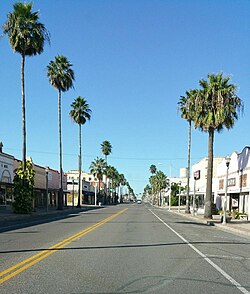Weslaco, Texas
| Weslaco, Texas | |
|---|---|
| List of Cities in Texas | |
| City of Weslaco | |

Downtown Weslaco
|
|
 |
|
| Coordinates: 26°9′33″N 97°59′15″W / 26.15917°N 97.98750°WCoordinates: 26°9′33″N 97°59′15″W / 26.15917°N 97.98750°W | |
| Country | |
| State |
|
| County |
|
| Government | |
| • Type | Council-Manager |
| • City Council |
Mayor David Suarez Gregory P. Kerr Leo Munoz Leticia "Letty" Lopez Gerardo "Jerry" Tafolla Olga Noriega Fidel Peña |
| • City Manager | Mike Perez |
| Area | |
| • Total | 12.8 sq mi (33.0 km2) |
| • Land | 12.7 sq mi (32.9 km2) |
| • Water | 0.1 sq mi (0.2 km2) |
| Elevation | 79 ft (24 m) |
| Population (2014) | |
| • Total | 37,601 |
| • Density | 2,123.1/sq mi (819.7/km2) |
| Time zone | Central (CST) (UTC-6) |
| • Summer (DST) | CDT (UTC-5) |
| ZIP codes | 78596, 78599 |
| Area code(s) | 956 |
| FIPS code | 48-77272 |
| GNIS feature ID | 1349656 |
| Website | www |
Weslaco is a city in Hidalgo County, Texas. The population was estimated to be at 37,601 as of the 2014 United States Census. It is located at the southern tip of Texas in the Rio Grande Valley and is part of the Southern United States. It is near the Rio Grande, across the border from the Mexican city of Nuevo Progreso, Rio Bravo, Tamaulipas, and is about 59 miles (95 km) west of South Padre Island and the Gulf of Mexico.
Weslaco derives its name from the W.E. Stewart Land Company. It was the hometown of Harlon Block, one of the Marines photographed raising the flag at Iwo Jima, and of film and television actor David Spielberg.
Streets north of the railroad tracks have Spanish names, and streets south of the railroad tracks bear names in English as a consequence of a 1921 municipal ordinance which declared that land north of the tracks be reserved for Hispanic residences and businesses, and land south of the tracks be reserved for “Anglo” residences and businesses. During World War II, sandbag production reached a peak in Weslaco, and the town declared itself the "sandbagging capital of the world."
Weslaco is part of the McAllen–Edinburg–Mission and Reynosa–McAllen metropolitan areas.
The present location of Weslaco was originally part of the Llano Grande land grant to Juan José Ynojosa de Ballí in 1790. After Ynojosa's death the grant was allocated to his children. Manuela and María received the land on which Weslaco is located today. The Ballí family ranched and maintained ownership of the land until 1852. In 1904, the Hidalgo and San Miguel extension of the St. Louis, Brownsville and Mexico Railway made its way to the site. It was promoted by Uriah Lott, Lon C. Hill, Jr. and others interested in developing the area through farming as opposed to ranching. The American Rio Grande Land and Irrigation Company of neighboring Mercedes purchased a major portion of the Llano Grande grant and platted the West Tract in 1913. In an effort to control raids from Mexico, the United States government stationed troops along the Rio Grande in 1916. A camp was established at the Llano Grande railroad depot. This camp was located between Mercedes and the current site of Weslaco. A watchtower was constructed at Progreso by these troops.
...
Wikipedia
